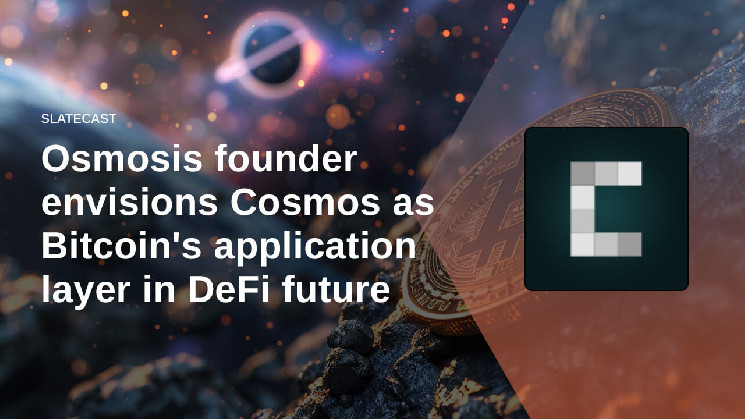
In a recent episode of the SlateCast, Akiba and Nate welcomed Sunny Aggarwal, the founder of Osmosis, for an insightful discussion about the Cosmos ecosystem, the rise of hyperbitcoinization, and the future of DeFi.
Hyperbitcoinization and the Role of Cosmos
Sunny expressed his long-standing vision of building the app layer for Bitcoin, a goal that motivated his involvement with Cosmos from the very beginning. He explained:
“Seven years ago, 2017, I thought we’re building for Bitcoin. How is this helping Bitcoin? And so that’s when I started working on Cosmos as this is how we build the app layer for Bitcoin.”
The introduction of Ordinals and other developments within the Bitcoin ecosystem has reignited the “Bitcoin Season 2” or “Bitcoin Renaissance,” presenting an opportunity for Cosmos to play a significant role in the hyperbitcoinization movement.
Alloyed Assets: Addressing Liquidity Fragmentation
One of the key topics discussed was the concept of “Alloyed Assets,” a solution designed to address liquidity fragmentation across different blockchain ecosystems. Sunny explained the rationale behind this innovative approach:
“What happened was about a year or two ago, Osmosis used governance and the DAO basically voted to make Axelar ETH the canonical ETH on Osmosis. The problem is that over the last two years, one or more bridges have come, like Wormhole, but also a lot more of activity in the Ethereum ecosystem has shifted towards L2s.”
Alloyed Assets allow users to deposit and withdraw tokens from various source chains, such as Ethereum L2s, while maintaining fungibility and improving the user experience.
Community Engagement and DeFi Innovation
Sunny highlighted the importance of community engagement in Osmosis’ success, stating that the team conducts quarterly customer surveys to gather feedback and shape the project’s development roadmap. He emphasized the need for continuous innovation in the DeFi space, citing the potential of combining social elements and DeFi:
“Especially with the rise of social, that’s where some of the really interesting stuff comes, when you combine social and DeFi. One of my things has always been DeFi and crypto today is very much designed in this model of the world, where we live in a trustless system, but I actually just don’t think that’s actually the real state of the world.”
Centralization vs. Decentralization Trade-offs
Addressing the debate around centralization and decentralization, Sunny expressed concerns about the shift towards centralized execution in the Ethereum L2 ecosystem, stating:
“The problem is the decentralization gives you more than just the safe, you know, in a blockchain, you’re looking for a bunch of different properties, right? You’re looking for safety, which means the correct execution of the protocol, but you’re also looking for liveness. Is the system always going to be online? You’re looking for censorship resistance.”
He advocated for mesh security, which leverages economic incentives across networks to enhance security and validity without compromising decentralization.
The episode also provided valuable insights into the future of Osmosis, the Cosmos ecosystem, and the broader DeFi landscape. With a strong focus on community engagement, innovation, and maintaining the core principles of decentralization, Osmosis continues to position itself as a leading player in the evolving world of decentralized finance.
New SlateCast🎙️: Bitcoinization of Cosmos
“I started working on Cosmos because this is how we build the app layer for #Bitcoin”
🎤 Guest: @sunnya97 co-founder of @osmosiszone
🗣️ Hosts: @NateWhitehill @akibablade pic.twitter.com/Y7clQGRz5P
— CryptoSlate (@CryptoSlate) April 17, 2024
